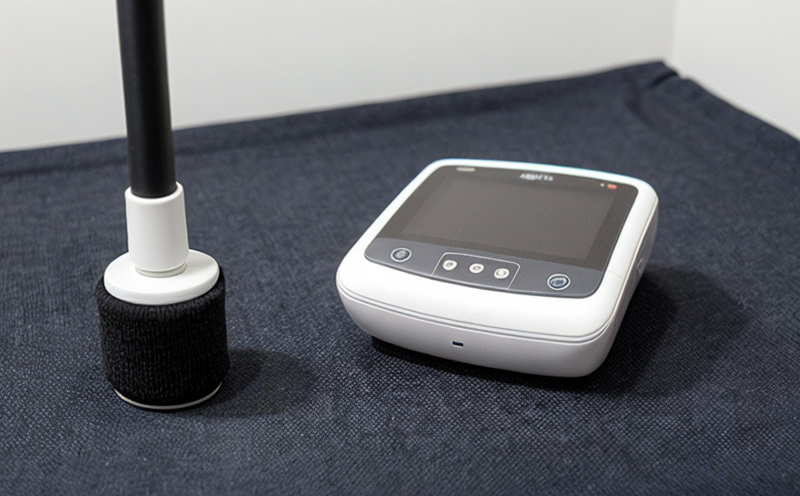IEEE 1621 Performance testing of wearable physiological sensors
The IEEE P1621 standard establishes a performance framework and methodology to evaluate the accuracy and reliability of physiological signals obtained from wearable sensor devices. This service focuses on ensuring that these sensors meet stringent requirements set forth by this international standard, which is critical for industries such as healthcare, fitness, and consumer electronics.
In today’s market, wearable devices are not just a trend but have become indispensable tools in various sectors. From monitoring vital signs to tracking physical activity, the accuracy of physiological data collected from these sensors can significantly impact user health outcomes and product performance. The IEEE P1621 standard provides a robust framework that helps manufacturers ensure their products meet high-quality standards.
Our laboratory specializes in providing comprehensive testing services for wearable physiological sensors based on the IEEE 1621 standard. Our team of experts uses state-of-the-art equipment to conduct rigorous tests, ensuring compliance with the latest industry standards and guidelines. We offer a range of services tailored to meet your specific needs, including:
- Compliance testing against IEEE P1621
- Signal accuracy verification
- Data consistency checks
- Long-term reliability testing
- User interface evaluation for ease-of-use and clarity
- Patient comfort assessment through ergonomic evaluations
We also provide detailed reports that outline our findings, offering insights into areas where improvements can be made. Our goal is to help you achieve regulatory compliance while enhancing the overall quality of your product.
Our services are designed for professionals in industries such as healthcare, fitness, consumer electronics, and more. By partnering with us, you gain access to cutting-edge technology and experienced personnel dedicated to helping you succeed. Let’s work together to ensure that every sensor meets the highest level of performance expected by today's consumers.
In addition to our core testing services, we offer consultation on best practices for designing compliant wearables according to IEEE P1621 standards. Our experts can assist with everything from initial design reviews through final production stages, ensuring every aspect aligns perfectly with the requirements set forth in this important standard.
Scope and Methodology
| Test Parameter | Description |
|---|---|
| Data Accuracy | Evaluation of the sensor's ability to accurately measure physiological signals. |
| Signal Consistency | Determining whether multiple readings from the same device yield consistent results over time and across different conditions. |
| User Experience | Assessment of how easy it is for users to interact with the device, including setup instructions and display clarity. |
| Ergonomics | Evaluation of factors like comfort, fit, and ease of use during prolonged wear. |
The IEEE P1621 standard sets out specific requirements for each test parameter mentioned above. Our methodology involves careful selection of appropriate tests based on the type of wearable device being evaluated. We ensure that all tests are conducted under controlled conditions to minimize variability and provide reliable results.
Our team follows a structured approach, starting with an initial review of technical specifications provided by you. This allows us to tailor our testing process accordingly. Once the test plan is agreed upon, we proceed with detailed calibration procedures followed by actual performance evaluations using real-world scenarios whenever possible.
Benefits
- Enhanced Product Quality: Compliance with IEEE P1621 ensures that your wearable devices consistently deliver accurate physiological data, enhancing user trust and satisfaction.
- Regulatory Approval: Meeting the stringent requirements outlined in this standard increases the likelihood of successful regulatory approval across various markets.
- Competitive Advantage: Demonstrating adherence to leading industry standards can set your brand apart from competitors, attracting more customers interested in premium quality products.
- Better User Experience: Through thorough evaluations of user interface and comfort aspects, we help improve the overall experience for end-users.
In addition to these direct benefits, there are additional indirect advantages as well. For instance, by ensuring compliance early in the development cycle, you can avoid costly rework or recalls later on. Furthermore, our detailed reports provide valuable feedback that could lead to innovation within your organization.
Our services not only assist with meeting regulatory requirements but also contribute significantly towards improving product quality and user experience. By leveraging IEEE P1621 performance testing, you can ensure that every aspect of your wearable device meets the highest standards expected by today's consumers.
Quality and Reliability Assurance
- Accurate Measurements: We use precise measurement techniques to validate sensor outputs against known reference values, ensuring consistent performance over time.
- Data Consistency: Our tests are designed to check for variability in measurements taken under different conditions and by multiple users. This helps identify any potential issues early on before they become significant problems.
We employ advanced statistical methods to analyze collected data, providing you with clear insights into the reliability of your devices. Additionally, we conduct long-term testing to assess durability and longevity, ensuring that your wearable sensors continue to function properly even after extended periods of use.
Our commitment to quality extends beyond just technical aspects; it encompasses every stage from initial design review through final production stages. By involving you throughout the process, we ensure that all decisions are made with full awareness of their implications on overall product performance and compliance status.





